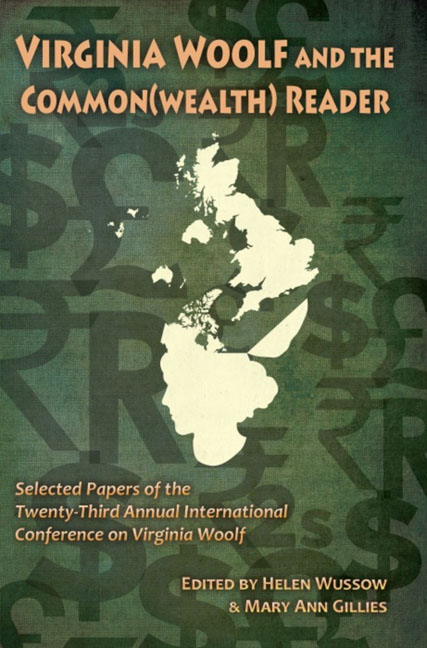Introduction to Virginia Woolf and the Common(wealth) Reader
Summary
The Twenty-third Annual Virginia Woolf Conference: Virginia Woolf and the Common(wealth) Reader was held in Vancouver, British Columbia, Canada on June 6-9, 2013 on the traditional territories of the Musqueam, Squamish, and Tsleil-Waututh Nations and under the auspices of and with support from Simon Fraser University. Our acknowledgment that the conference was held on unceded First Nations territories is more than a customary, polite gesture; it speaks directly to the theme of the conference, the concept of “common(wealth)” as geographical, political, and imaginary spaces in which different readers and readings vie for primacy of place. The call for papers invited proposals that addressed Woolf's interactions with/influence on Commonwealth writers, the issues of “common” wealth, discussions of wealth and gender, colonialism, imperialism, politics, and a host of related topics. How the papers and presentations addressed these notions reflects the fact that “common(wealth)” is inevitably a constructed entity, one that necessarily embodies tensions between the communal and the individual, between traditional cultural forms and emergent ones, between indigenous peoples and colonial powers, and between literary insiders and outsiders. The array of rich offerings that produced an energized and energizing conference are represented here by a selection of the papers and creative offerings that were presented by scholars and writers from across the globe.
The poetic invocations with which this volume opens—“Writing In/Against Notions of a Commonwealth” by Jordan Abel, Fiona Tinwei Lam, Cecily Nicholson, and Renée Sarojini Saklikar – capture two of the central preoccupations of the conference. Writing is a means of communication that depends on a commonality of language, of cultural heritage, of shared knowledge to create a “commons” in which the “wealth” of the community may be shared. The power and reach of this “commons” were on display in plenary addresses such as Rosemary Ashton's and Paul Delany's, the former focusing on the important role played by educational institutions in late nineteenth-century Bloomsbury and the latter on Rupert Brooke and his circle, including Woolf. Panel discussions such as that on the Hogarth Press and digital humanities and papers such as Karen Levenback's which argues that the “common wealth” of Virginia Woolf studies “is based on memory” (197) in the form of the archives of previous Woolf conferences spoke eloquently to the “common(wealth)” of knowledge that we, as scholars, create and share.
- Type
- Chapter
- Information
- Virginia Woolf and the Common(wealth) Reader , pp. vii - xiiPublisher: Liverpool University PressPrint publication year: 2014



